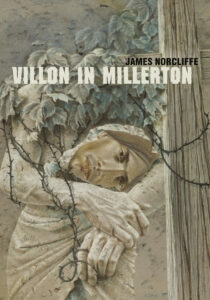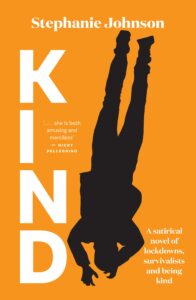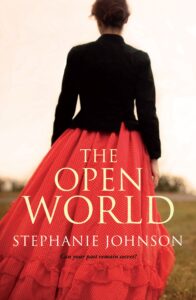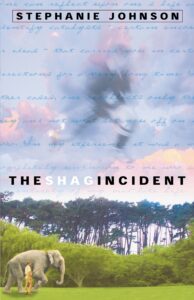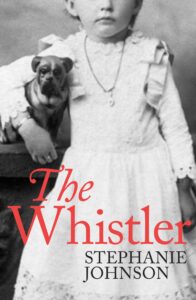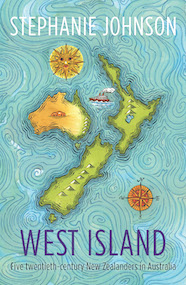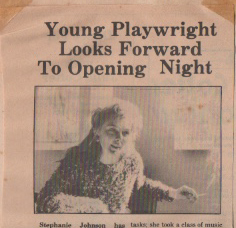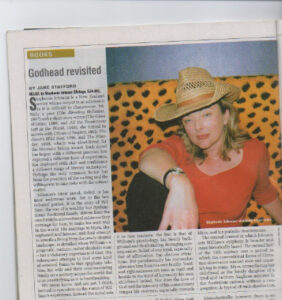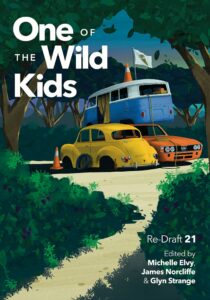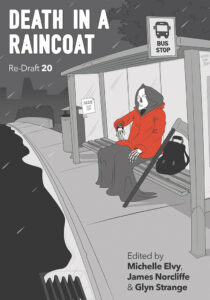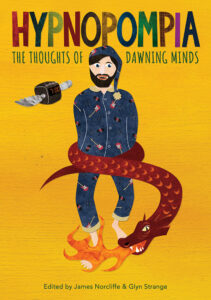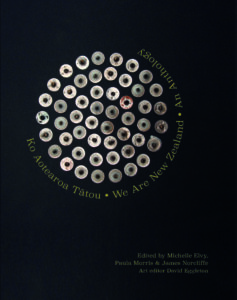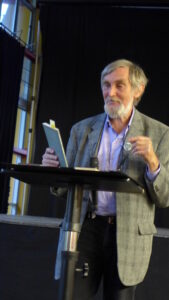
Images: James Norcliffe (image supplied), Stephanie Johnson (image credit: Maeve Woodhouse)
‘The Award Changes Everything’
Paula Morris talks to Stephanie Johnson and James Norcliffe about their Prime Minister’s Literary Awards.
Neither Stephanie Johnson nor James Norcliffe were expecting the call from Malcolm Burgess from Creative New Zealand. Burgess, an affable former journalist, has the bureaucratic job title of ‘Arts Practice Director (Literature)’, and is usually the sounding board for writers’ complaints, demands and laments. Johnson says her ‘initial response was one of total disbelief.’ Norcliffe, working in his garden when the call came on the rarely used landline, thought that ‘someone had nominated me as a referee on a CNZ application of some sort.’
Both were ‘delighted’, they say, when they realised they were both being given one of the Prime Minister’s Literary Awards. Three—for poetry, fiction and/or drama, and nonfiction, each valued at $60,000—are awarded annually. Johnson was this year’s fiction recipient and Norcliffe was recognised for poetry. Nonfiction was awarded to historian Vincent O’Malley, winner at the Ockham New Zealand Book Awards this year for Voices from the New Zealand Wars | He Reo nō ngā Pakanga o Aotearoa.
The Prime Minister’s Literary Awards will be thirty years old next year. In 2003 the prime minister was Helen Clark and the first recipients were Hone Tuwhare (poetry), Janet Frame (fiction), and Michael King (nonfiction). Tuwhare was in his 80s and Frame in her late 70s, their selection setting the precedent for giving the awards to writers senior in both years and status. King was in his late 50s, but had just published the landmark Penguin History of New Zealand. (His award, sadly, was just in time: he died in a car accident the following year.)
In the following decades, the PM’s Awards have recognised a number of writers born in the 30s and 40s, including Kevin Ireland, Vincent O’Sullivan, Bill Manhire, Elizabeth Smither, Cilla McQueen and Fleur Adcock, for their poetry; fiction writers Maurice Gee, Margaret Mahy, Patricia Grace, Albert Wendt, C.K. Stead, Fiona Kidman, Owen Marshall, Marilyn Duckworth and Witi Ihimaera; and nonfiction writers Philip Temple, Anne Salmond and the late James McNeish.
As high-profile career awards, they’ve inevitably been the source of controversy, particularly when older and more acclaimed writers seemed overlooked: historian Claudia Orange and Māori arts scholar Tīmoti Karetu, both only received the award (in 2021 and 2020, respectively) after nonfiction writers more than two decades their juniors, and arguably not their equals in prominence, had been awarded.
In 2018 Peter Wells, terminally ill, was widely anticipated to win the nonfiction prize; it went instead to Wystan Curnow for his art scholarship (rather than his poetry), leading to some accusations of malfeasance on the part of CNZ’s ‘expert panel’ who assess the public nominations: one of that year’s panel, Murray Edmond, had taught alongside Curnow for many years in the English department at the University of Auckland. It was also the second year in a row that the nonfiction award went to a fine-arts writer who had retired from the English department at the University of Auckland (Peter Simpson, in the same year another retired Auckland professor, Witi Ihimaera, was honoured as well.)
Still, Johnson says, the Prime Minister’s Awards are ‘unique and important’ because ‘writers are nominated by their readers and peers.’ (Disclosure: I have nominated Johnson myself more than once for this award.) ‘It’s validation and acknowledgement and makes an enormous difference to a writer’s state of mind and generally shaky self-belief.’
Norcliffe agrees. ‘Writing is of course a solitary act and if you are, like so many I know—including myself—something of a perfectionist you’re never completely confident in the worth of what you’re doing or entirely happy with the finished product. To have your work validated by others—readers, critics, reviewers—is both gratifying and necessary. This award is in many ways the ultimate validation.’
It may seem strange—to people who aren’t artists—that writers of such experience and pedigree still relish ‘validation’. ‘It is a sad truth,’ Johnson says, ‘but for most of us, even when we have written many books or plays or volumes of short stories or poems, imposter syndrome can still hold sway. I think New Zealand writers are particularly vulnerable to this, because we are (mostly) writing only for our small population. I remember years ago a publisher saying to me that if my books sold to the same percentage in a larger population, I would be a wealthy woman.’
New Zealand writers living in country must, Johnson says, ‘to some degree, embrace a modest lifestyle. Most of us have to teach, act as mentors, carry out manuscript assessments, review, drive buses, wipe bottoms, pluck chickens and wait tables. It worries me that many of our younger writers, particularly those carrying large student loans, anticipate that they will one day make a living from writing. A tiny percentage will, and mostly those are writers who leave our shores, and/or embrace writing genre. If you play your cards right, there’s money to be made writing crime and romance.’
Although the Prime Minister’s Awards are genre-specific, both Norcliffe and Johnson have published widely in various genres. Norcliffe says he wears ‘a number of writing hats: poetry, fantasy fiction for young people, fiction for older people, and editing. I sometimes wonder whether the poets regard me as a children’s writer who writes poetry, and the children’s writers regard me as a poet who writes children’s fiction. That’s one of the reasons this award was such a delight as I always felt I might fall between the stools when such accolades were being decided.’
Norcliffe has published 11 collections of poetry, a short story collection and the 2022 novel The Frog Prince, as well as several award-winning novels for young people. He believes that his ‘breakthrough children’s book’ was The Loblolly Boy (2011), winner of the 2010 NZ Post Award for Junior fiction and also had international success. His sixth poetry collection Villon in Millerton (2007) was an artistic turning point—‘I felt lifted my work to a higher level’—that served as a foundation for his subsequent collections.
In 2023 Johnson will publish her fifteenth novel, Kind, and her fourth short story collection. She’s also the author of two volumes of poetry and two non-fiction books. ‘When I look back over them,’ she says, ‘the books I feel the fondest of are The Heart’s Wild Surf (1996), The Open World (2012), The Shag Incident (2002), The Writing Class (2013), Everything Changes (2021) and The Whistler (1998). These are variously historical fiction, satire, contemporary fiction and science fiction.’ She’s also proud of the 2019 nonfiction book West Island: Five Twentieth Century New Zealanders in Australia.
‘I didn’t start out as a prose writer. Like many of us, I wrote poetry first, and then plays. My play ‘Accidental Phantasies’ enjoyed two long seasons in Wellington and Auckland, and won me the Bruce Mason’s Playwriting Award, when I was twenty-four. I have had plays produced since, but none so successful.’
Both writers have also made major contributions to New Zealand’s literary scene and infrastructure. For the past twenty years, Norcliffe has worked with Glyn Strange on the annual ReDraft collections of the very best writing by teenagers. His fellow selector for some years was Tessa Duder, recently replaced by Michelle Elvy. ‘Each year we find upwards of a hundred prodigiously talented young writers whom Glyn publishes in a handsome collection. The best of the contributions are Landfall quality. Sadly, only a smattering of these young writers carry on to make names for themselves in the wider literary world. Perhaps events overtake them, perhaps they lose interest, perhaps the opportunities are not there.’
Norcliffe notes that despite our challenging times, ‘some adventurous new publishing ventures [are] entering the market’ along with new online journals. ‘Over the last few years, I’ve been involved in helping put together some major anthologies—most recently Ko Aotearoa Tātou | We Are New Zealand (with Michelle Elvy and me). Such a range of voices and what depth and brilliance!
In 1997, with the late Peter Wells, Johnson founded the Auckland Writers’ Festival. ‘Penelope Hansen, Jill Rawnsley and Anne O’Brien in their capacities as festival manager/director made the festival what it is today,’ she says, ‘but I am fiercely proud of being there at the start, acting as director and serving on the Board, in various roles for around sixteen years.’ A number of other local writers and advocates ‘worked just as hard on the Auckland Writers’ Festival as we did over the first years,’ singling out the late Keith Stewart and Stephen Stratford, who ‘were supportive and inspirational.’
‘At the outset, Peter and I wanted to showcase New Zealand writers. We did not intend for the festival to become, in Peter’s words, ‘a landing strip for the Booker shortlist’. It was our great pleasure to introduce writers that had not necessarily ever won a prize, but whose books deserved relishing.
‘It was also our objective to build a bridge over the Tasman and introduce Australian writers to festivalgoers. We hoped that this would become a mutual exercise with the Australian festivals. To date, there has been some improvement but perhaps not all we hoped for. The immutable fact is that if we don’t celebrate our own national literature, our own writers and their work, no one else will.’
Like Norcliffe, Johnson continues to identify and mentor new voices. A long-time judge for the Sunday Star Times Short Story Award, Johnson is a fiction judge for the Jan Medlicott Acorn Prize for Fiction, to be awarded in 2023 at the Ockham New Zealand Book Awards. ‘I can report that our fiction is in excellent health,’ she says. ‘I am continually surprised by the inventiveness, diversity, proclivity for lively language and the compelling story-telling skills of my compatriots.
In addition, this year alone, Johnson taught a semester in creative non-fiction at Massey University; worked for a production company as a hired writer/director on a podcast; assessed several manuscripts, both fiction and non-fiction; examined a thesis for the MCW at Auckland University; written a reader’s report for a publisher and reviewed many novels for several magazines and websites, including the ANZL. She enjoys the work by admits that ‘much of it is poorly paid. I perhaps wouldn’t have enjoyed driving busses and trucks, but just before I heard about the award I made enquiries about getting my HT licence. There’s a shortage of bus and truck drivers, and I was willing to give it a go.’
‘But the award changes everything,’ says Johnson. ‘Before August I had written about 30,000 words of a new novel. Now I will be able to go back to it because the Prime Minister’s Award has bestowed that elusive quality that eludes even senior writers: peace of mind. There is money in the bank and life is not entirely pointless. This new book is partly set on Waiheke Island. I think I might go overseas to do some research.’
For Norcliffe, the award reminds him of ‘being awarded the Burns Fellowship in 2000—another huge fillip to my confidence and feelings of security as a writer.’ He ‘cannot stress enough,’ he says, ‘the importance of such residencies and awards.’
'I felt energised by the freedom of 'making things up’' - Maxine Alterio




